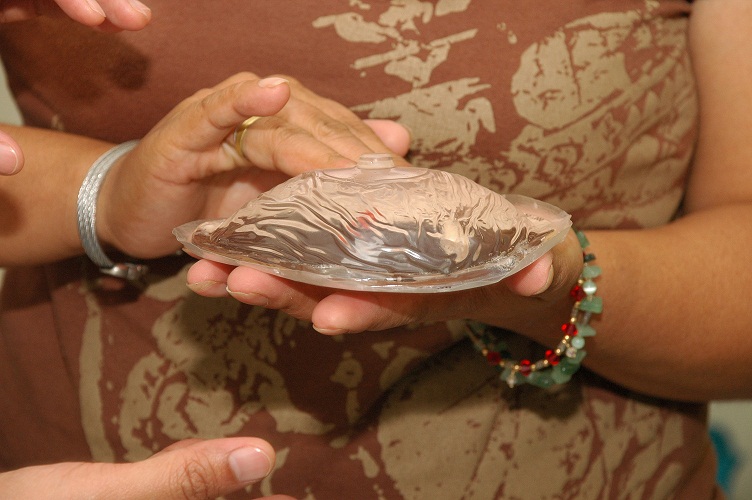By CARLA PARAS-SISON
CAN a breast injury cause breast cancer? Do older women have a lower or higher risk of breast cancer? Are women with no family history of breast cancer immune to it?
These are some of the questions that Dr. Cecille Montales, a volunteer of ICanServe Foundation, answers at forums organized by the local government unit (LGU) and ICanServe Foundation, a Philippines-based patient group that advocates early breast cancer detection.
The forums are part of Ating Dibdibin, literally to take seriously in Tagalog, and translated in relation to the advocacy as “Take Your Breast Care to Heart”. It is a comprehensive community-based breast cancer screening program that teaches early breast cancer detection techniques.
According to the Department of Health, breast cancer became the leading cancer site in the Philippines, with an estimated 12,262 new cases in 2010 and 4,371 deaths. While data for stages of cancer diagnosis are not published by the Philippine cancer registries, the low five-year survival rate for breast cancer of 47%, compared to 80-98% in developed countries (2010 Philippine Cancer Facts and Estimates, Philippine Cancer Society) indicates that most breast cancers in the Philippines are discovered in the late stages.
Launched in 2008, Ating Dibdibin conducts free breast cancer forums and screening sessions. Should anyone be diagnosed with a suspicious lump upon screening, the program provides access to financial help for diagnostics and treatment.
Under an agreement with ICanServe Foundation, a locality like a city or province undertakes to make the program permanent. The foundation then trains the locality’s medical team and barangay health workers, or the community health workers. They learn the proper way to do a clinical breast examination, recommended annually for women aged 30 and older.
ICanServe also trains breast cancer survivors in the locality so they can share their journey of healing and encourage other women to take charge of their health. In addition, health workers and survivors are trained in patient care, or how to follow up on women who need to undergo additional laboratory tests or if diagnosed with breast cancer, the recommended treatments.
Most women postpone going to the doctor despite knowing they have suspicious breast lumps. The Philippine Cancer Society (PCS) acknowledges that “lack of awareness may not be the major reason why majority of breast cancers are not diagnosed early. Inability of most patients to afford the direct and indirect costs of diagnosis and treatment, as well as related socio economic impediments, may well be the major barriers that have to be overcome.”
By providing affordable diagnostic examinations and access to cancer treatment, Ating Dibdibin addresses the major concern of women who refuse to have their breasts or breast lumps checked.
The first Ating Dibdibin piloted in Marikina City in 2008 to 2009, covering the city’s 16 barangays. The program provided free mammography, free biopsy, free surgery, discounted ultrasound and access to government funding agencies and the PCS.
A total of 21 breast cancer forums reached 2,221 participants. Of 1,650 women screened, 179 were found to have suspicious lumps. These women were followed up by assigned patient navigators but only 69 went for additional tests. Of these, four were eventually diagnosed with breast cancer and received subsidized medical treatment.
“The biggest challenge of Ating Dibdibin is patient navigation. As in any public hospital, patient compliance is near zero. Besides asking the medical team of the LGU to never give up following on the women, we have partnered with the PCS to conduct training. The PCS has the modules created by patient navigation pioneer Harold Freeman of Harlem, New York,” says Kara Magsanoc-Alikpala, founder of ICanServe Foundation.
Results of research done in Marikina City showed that because of the foundation’s intervention, Ating Dibdibin changed women’s behavior toward cancer. Those who attended the forums and screening sessions no longer fear breast cancer and conduct monthly breast self-examination.
In 2011, under a new local executive, the program was relaunched in Marikina. The city institutionalized the program and created the first breast cancer trust fund in the country. Clinical breast examination is now provided routinely by barangay health workers.
Panabo City (2010) in Davao province and Taguig City (2012) have also adopted Ating Dibdibin as permanent programs.
Ating Dibdibin program manager Lynne Catuncan says the program is widely welcomed by the barangays. “Women who have attended our fora say they have learned a lot about breast cancer. Some even say their fears lessened,if not are totally gone. But almost unanimously, women fear mammography, they’re afraid of the perceived pain of the procedure,” Catuncan shares.
This is where Montales’s lecture answering queries and dispelling breast cancer myths becomes important. Yes, mammography can be painful but women aged 50 and older will benefit immensely from bearing a few minutes of inconvenience. Contractions for birthing are more painful.
Ating Dibdibin aims to cover as many cities as possible and is open for partnership. It also wishes for its partners to duplicate the program in the partners’ chosen locales.
ICanServe Foundation hopes that as more LGUs sign up for the program, breast cancer will be diagnosed in the earlier stages over time, and hence, survival rates will rise to those seen in the developed world.
